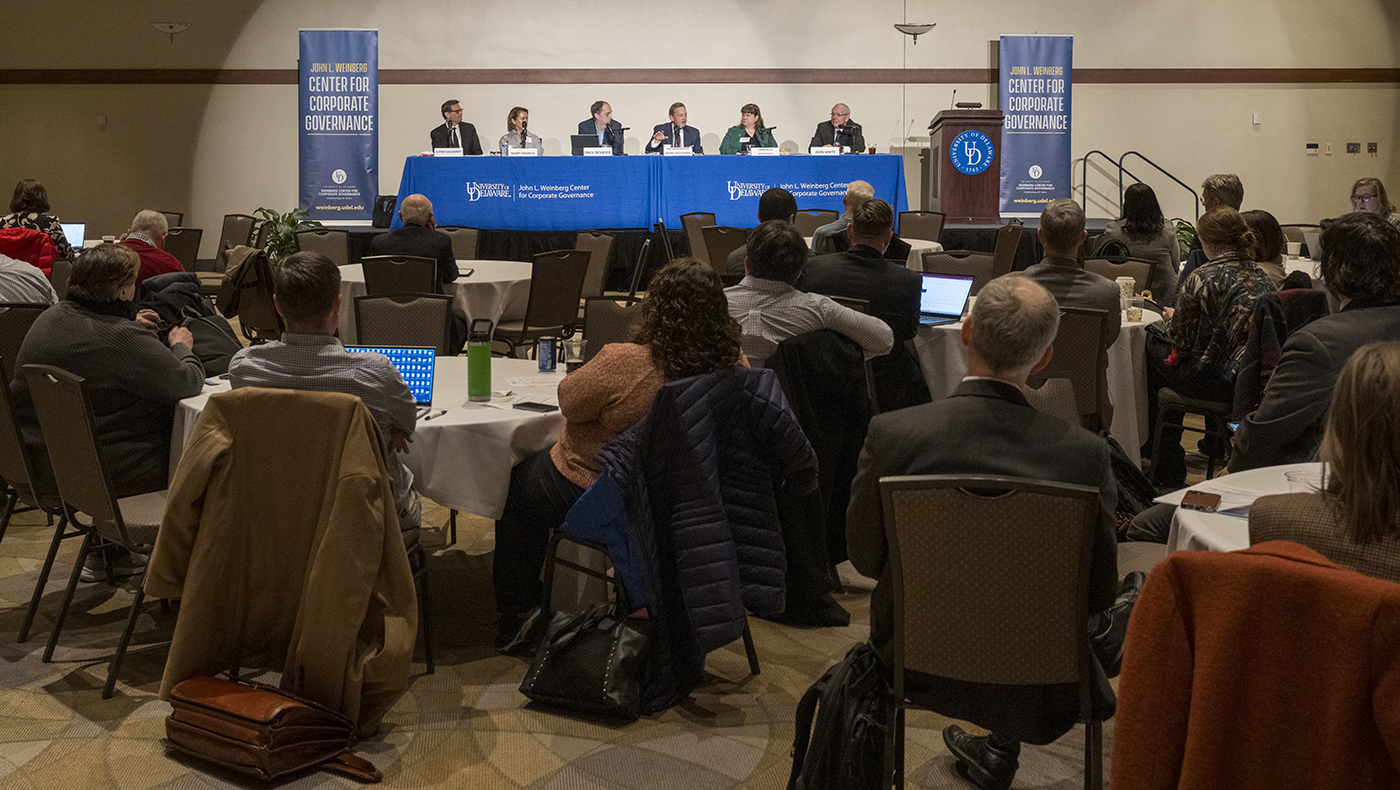Upcoming regulations on financial disclosure were very much on the minds of participants in a symposium on Environmental, Social and Governance (ESG) at the University of Delaware in February.
The John L. Weinberg Center for Corporate Governance held its third symposium on the topic of ESG on Feb. 21 at Clayton Hall.
ESG refers to a movement to push publicly owned companies to consider not just profits, but key factors like the environment and climate change, diversity on boards and workforces, and better governance practices. It’s been a topic of discussion for quite some time, but has risen to prominence in the past few years.
The movement has also become a political flashpoint, as some have pushed back on the grounds that it’s politically motivated and that companies should stick to a mission of benefiting shareholders and making profits.
The Weinberg symposiums focus on how companies can understand the ESG phenomenon and best respond to it.
Experts gathered for two panels during the afternoon event, one focused on climate disclosure requirements and a second on navigating backlash against ESG. They included Paul Atkins, chief executive at Patomak Global Partners and former SEC commissioner; Michael Arnold, partner at Cravath, Swaine & Moore; Paul Beswick, EY Americas director of accounting and former chief accountant for the SEC; Andre Bouchard, former chancellor of the Delaware Chancery Court and advisory board chairman at Weinberg; Mary Francis, corporate secretary and chief governance officer at Chevron; Consuelo Hitchcock, principal at Deloitte in its Regulatory Affairs Group; and Jeffrey Mahoney, general counsel for the Council of Institutional Investors. John White, partner and chair of the Corporate Governance and Board Advisory practice at Cravath, Swaine & Moore and a regular commentator at the ESG forums, moderated the panels.
The participants, White clarified, only spoke for themselves and not their organizations. The event also followed Chatham House Rules, meaning participants would not be directly quoted, a nod to the sometimes controversial nature of the topic and a desire for open conversation.
Here are some key topics the panelists discussed.
Evolving rules about disclosure
The Securities and Exchange Commission’s long-awaited rules on climate change disclosures were a major topic, with a decision expected soon, possibly sometime in March. The SEC has gotten a large amount of feedback from companies concerned that these rules will put a burden and expense on their operations.
Some felt the SEC was likely to be hit with a lawsuit once these new rules are adopted.
Panelists noted that regardless of what the SEC decides, new stricter rules are being adopted in Europe and California, and this means many companies will have to put resources into this kind of disclosure in any event. They also said many companies are already doing voluntary ESG disclosures thanks to investor demand, and that this isn’t going to change.
One panelist noted the need for standard rules, saying a nightmare scenario would be companies having to comply with multiple sets of rules in various states. (There are also varying international standards on top of this.)
They also discussed the need for accurate board minutes that capture the essence of what was discussed, and the importance of board members who are willing to engage on these issues and review board minutes carefully.
What does ESG even mean?
Many of the participants don’t care for the term “ESG,” saying it’s too vague and conflates governance with other issues. They recommend a focus on ESG as part of risk management, where companies address multiple risks (including the environment, if it’s related to their operations) and explain to investors how they are addressing those risks.
What gets included in a discussion of risk and investor value, of course, is at the root of ESG debate, with some investors calling for much more focus on environmental impacts.
When politics comes into play
Speaking of risks, the political tug of war has become a worry for companies, and panelists spent time on how those risks are evolving and how to deal with them.
Pushback against ESG wasn’t discussed much at Weinberg’s prior conferences, but the debate has grown since then. Now, companies need to have a clear understanding of how they’re going to navigate these issues.
Often, this pushback comes from conservative groups who argue that ESG efforts are politically driven and don’t benefit shareholders.Still, while there’s been an increase in shareholder proposals targeting ESG, most proposals are still in favor of its goals, panelists said.
They advised companies to stay out of political hot topics that don’t directly touch their operations. Some organizations are steering away from the term ESG, while still addressing the core issues at stake.
The event
The ESG symposium drew a sizable crowd to Clayton Hall, including lawyers from a number of firms, academics from multiple universities, consultants, board directors, and representatives of nonprofits. The audience had a chance to participate in a Q&A session and then network at a reception afterward.
Justin P. Klein, director of the Weinberg Center, expressed his appreciation to the panelists, and noted that the insights on board responsibilities and composition were very helpful.
“The content and particularly the practical advice for boards were the hallmarks of the event,” he said.




